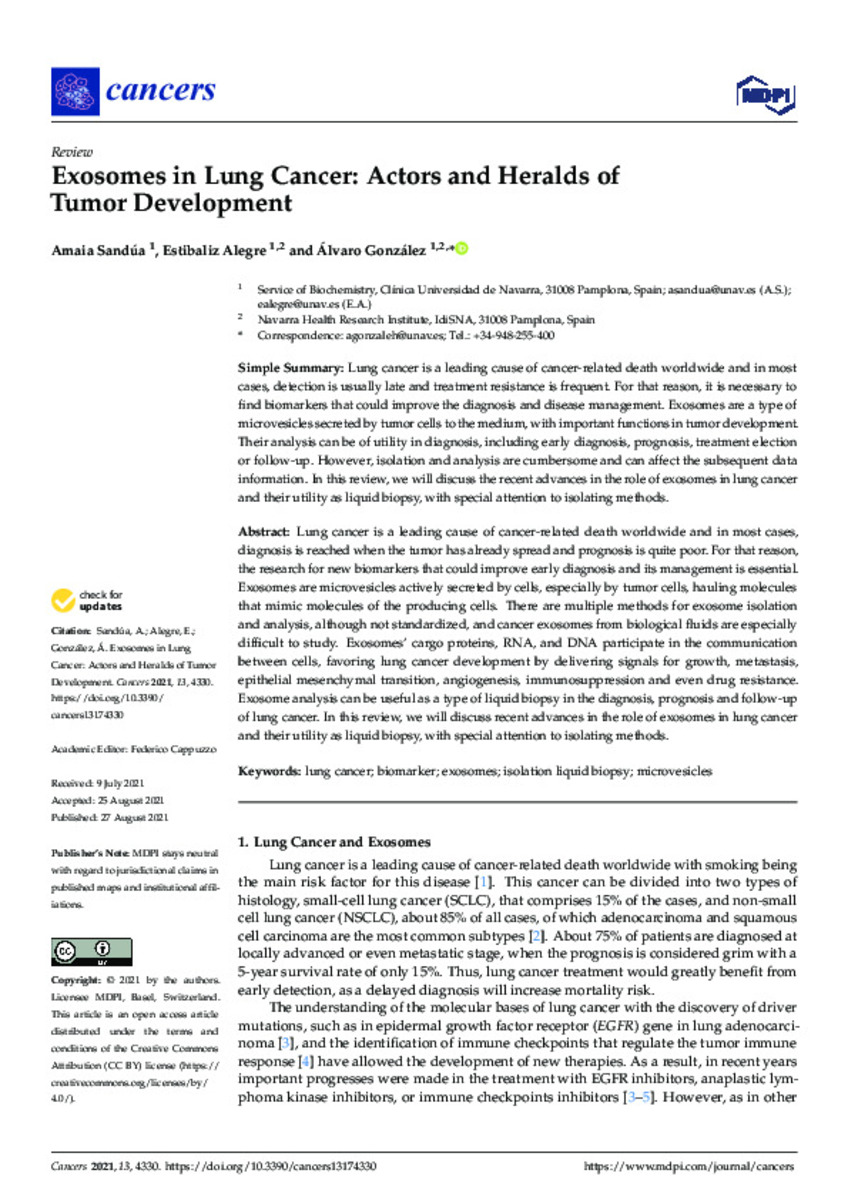Full metadata record
| DC Field | Value | Language |
|---|---|---|
| dc.creator | Sandúa-Condado, A. (Amaia) | - |
| dc.creator | Alegre-Martinez, E. (Estibaliz) | - |
| dc.creator | Gonzalez-Hernandez, A. (Alvaro) | - |
| dc.date.accessioned | 2021-12-16T10:55:03Z | - |
| dc.date.available | 2021-12-16T10:55:03Z | - |
| dc.date.issued | 2021 | - |
| dc.identifier.citation | Sandua-Condado, A. (Amaia); Alegre-Martínez, E. (Estíbaliz); González-Hernández, Á. (Álvaro). "Exosomes in lung cancer: actors and heralds of tumor development". Cancers. 13 (17), 2021, 4330 | es |
| dc.identifier.issn | 2072-6694 | - |
| dc.identifier.uri | https://hdl.handle.net/10171/62669 | - |
| dc.description.abstract | Simple Summary Lung cancer is a leading cause of cancer-related death worldwide and in most cases, detection is usually late and treatment resistance is frequent. For that reason, it is necessary to find biomarkers that could improve the diagnosis and disease management. Exosomes are a type of microvesicles secreted by tumor cells to the medium, with important functions in tumor development. Their analysis can be of utility in diagnosis, including early diagnosis, prognosis, treatment election or follow-up. However, isolation and analysis are cumbersome and can affect the subsequent data information. In this review, we will discuss the recent advances in the role of exosomes in lung cancer and their utility as liquid biopsy, with special attention to isolating methods. Lung cancer is a leading cause of cancer-related death worldwide and in most cases, diagnosis is reached when the tumor has already spread and prognosis is quite poor. For that reason, the research for new biomarkers that could improve early diagnosis and its management is essential. Exosomes are microvesicles actively secreted by cells, especially by tumor cells, hauling molecules that mimic molecules of the producing cells. There are multiple methods for exosome isolation and analysis, although not standardized, and cancer exosomes from biological fluids are especially difficult to study. Exosomes' cargo proteins, RNA, and DNA participate in the communication between cells, favoring lung cancer development by delivering signals for growth, metastasis, epithelial mesenchymal transition, angiogenesis, immunosuppression and even drug resistance. Exosome analysis can be useful as a type of liquid biopsy in the diagnosis, prognosis and follow-up of lung cancer. In this review, we will discuss recent advances in the role of exosomes in lung cancer and their utility as liquid biopsy, with special attention to isolating methods. | - |
| dc.language.iso | en | - |
| dc.rights | info:eu-repo/semantics/openAccess | - |
| dc.subject | Lung cancer | - |
| dc.subject | Biomarker | - |
| dc.subject | Exosomes | - |
| dc.subject | Isolation liquid biopsy | - |
| dc.subject | Microvesicles | - |
| dc.title | Exosomes in lung cancer: actors and heralds of tumor development | - |
| dc.type | info:eu-repo/semantics/review | - |
| dc.relation.publisherversion | 10.3390/cancers13174330 | - |
| dc.description.note | This article is an open access article distributed under the terms and conditions of the Creative Commons Attribution (CC BY) license (https:// creativecommons.org/licenses/by/ 4.0/). | - |
| dc.identifier.doi | 10.3390/cancers13174330 | - |
| dadun.citation.number | 17 | - |
| dadun.citation.publicationName | Cancers | - |
| dadun.citation.startingPage | 4330 | - |
| dadun.citation.volume | 13 | - |
Files in This Item:
Statistics and impact
Items in Dadun are protected by copyright, with all rights reserved, unless otherwise indicated.






